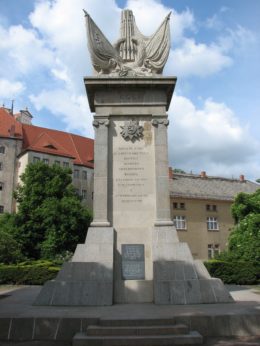
If you studied the mien of the men, you could tell the war was over. The lines of tension in faces were gone, the lurking fears that clouded eyes were gone, the cautious gaits were gone. Aided by a decent supply of “liberated” liquor, the men walked with abandoned swaggers and the perpetual laughter seemed to say, “I made it! I’m alive!”
Our unit was housed in a little town which sat on the Elbe River, some 50 miles south of Magdeburg. We had commandeered the best houses in town and “asked” the German occupants to move out and double up with friends until we left. For the first time since we left England for the Omaha Beach landing in Normandy on D-Day +2, we slept in beds between sheets. Life was sweet. The slaughter had ended – yet its tragedies lingered on.
We soon learned that the town was a major crossing point for repatriating liberated slave laborers and prisoners of war whose homelands were east of the Elbe. The town was a good staging area for such a crossing since the river narrowed considerably at this point. In a few days, U.S. and Red Army engineers had thrown up pontoon bridges across the quiet river, about 100 yards apart.
The word was that the bridge our engineers had built was called the J.V. Stalin Bridge and the one the Soviet army men constructed, the F.D. Roosevelt Bridge. Was it true? It didn’t matter. Our men believed it to be so because they wanted to believe it. The war had brought our two peoples close, and, even though we never met Soviet soldiers, we knew of their unforgettable feats and they dwelt in our hearts like brothers.
The morning of repatriation rose warm and dry. Thousands were expected and that morning dozens of our men, myself among them, climbed a steep bluff above the flatlands that rolled down to the river. From this vantage point we could watch our liberated friends gathering to cross the bridges.
Soon the trucks began to arrive with their precious cargoes pouring out men, women and children. Many, emaciated and in rags, rushed toward each other, embraced, kissed and wept. Hundreds quickly grew to thousands. The shrieks and shouts rose louder and louder, reaching a deafening pitch.
As each truck arrived it hurled huge swirls of dust into the air, which seemed to dance in tune with the unbounded joy of the people. Finally, organized lines of 15 to 20 abreast formed in front of the bridges. From “nowhere” banners and flags appeared and floated above the crowd. Suddenly, as though on signal, backs straightened, shoulders squared, and the mighty throng surged forward,
A babel of shouts and songs tore at the sky while on the other side of the Elbe, lined up and down the river bank as far as the eye could see, were thousands of cheering Red Army men. Hurrah! Hurrah! over and over; like thunder it rolled across the river to embrace their returning kin. Life had triumphed over death!
The moment was overwhelming; I could not hold back tears. I turned and looked at the men about me. They were weeping. Some wept with screwed-up faces, gargoyle-like, fighting but failing to hold back tears, as though to weep were beyond the bounds of masculinity. Some wept with open mouth, soundless shouts of joy, while tears flooded their cheeks and neck and soaked their collars. Some sobbed audibly.

There we stood that brief moment, locked together by such incredibly deep emotions which the suffering of war had swept to the surface, shaping our common humanity!
After a while the weeping stopped and we stood there silent, perhaps surprised and embarrassed by our naked feelings. Then some men tripped off the bank back to barracks. After some hours almost all were gone, back to simple soldier pleasures.
All day and into dark the columns marched. Finally we all left the bluff. At supper few words were said and the unusual silence was loud and strange; the lumps in our hearts were still too large for words.
The men who stood upon the river’s bank that day have long forgotten what they saw and how they felt. Life’s daily struggle eats up so much of the past. Yet I hope with all my heart that it stayed with them as it stays with me.
The Elbe was quiet then. Only ships in peaceful trade plied its currents. The flag of peace had been mounted on its banks and a great German working-class power stood guard. The passing years have not dimmed my vision of that day. I see it yet, again and again.
And then in my mind’s eye it reappears. I see the liberated throngs rushing toward the bridge. I see the luminous tearful eyes. I hear the ascending thunder of the great hurrahs crossing the expanses of the Elbe. And the tens of thousands of singing, shouting, marching, joyous voices crying out, “Homeland … I’m coming … dear homeland.”
It is said that war makes beasts of men. I say the most bestial of men make war. Damn the imperialist war-makers! Peace-loving humanity must sweep them from the face of the world! The guns and bombs must be silenced forever!










